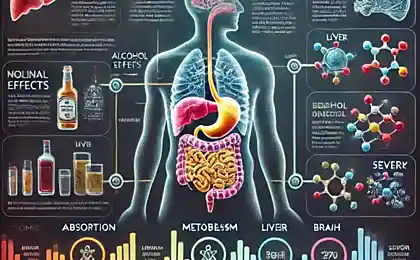699
5 myths about alcohol
We debunk scientific myths and familiarize the readers with the comments of experts explaining common misconceptions. We asked the biologist Svetlana Borinskaya to talk about the reasons why you have formed certain preconceived ideas about alcohol.
Eighty seven million eight hundred sixty three thousand forty eight
Drunkenness is a characteristic of the Russian tradition
It's not true. Russia is the stage which many Western countries have been in the early twentieth century, when the increase in income has led to increased drinking, which has been reduced by the introduction of measures of state regulation of prices for alcoholic beverages and the restriction of time and places that sell them.
During the first half of the twentieth century alcohol consumption in the USSR was much lower than in Western Europe. For example, in the years 1948-1950 alcohol consumption was as follows: France — 21.5, Spain — 10.0, Italy — 9.2, UK 6.0, US — 5.1, the Soviet Union — 1.85 l (in terms of pure alcohol per person per year). Until the 1960s years the level of alcohol consumption in the USSR did not exceed 5 litres per person per year: 1940 — 2.3 l, 1950 — 1.7 l per capita per year. Consumption doubled by 1956 and tripled by 1962
Further, under Brezhnev, consumption growth, and real 1980-1984 alcohol consumption per capita amounted to 13.1–14.8 L. Russia took the first place in Europe. However, by this time, due to adverse demographic dynamics (growth, mortality and disease, reduced fertility) Soviet statistics on this problem were classified.
Russians tend to drink no more than other Nations, and this tendency is governed by the country's policy limitations or permit the sale of alcohol. Because of the ability of alcohol to cause euphoria (and with regular consumption — dependence) of free availability of alcoholic drinks leads to the alcoholization of the population regardless of nationality and polity.
Moderate alcohol consumption is good for health
It is only partly true. Epidemiological studies show that people who moderately consume alcohol (less than 50-100 grams in terms of pure alcohol per week) were indeed more healthy and live longer in comparison not only with those who drink more and those who completely abstain.
Have moderately consuming alcohol is also higher the level of education, income and physical activity (they often do in the gyms or sail), they eat more fruits and vegetables and in General have a more healthy lifestyle. And stress levels are lower. However, to conclude from the coincidence that alcohol is the cause of good health, should not be.
Moderate consumption of alcohol may simply be a marker of social well-being. Bad health of abstainers may not be due to the fact that they do not consume alcohol, but rather the reason behind it. Alcohol cannot be recommended as a means of improving health. The nutrients contained in wine, are also contained in fruit juices.
In Russian there are genes that cause them to drink
It's not true. None of the genes that influence the consumption of alcohol, Russians do not differ from other peoples of Europe. There are two groups of genes that are associated with the development of alcohol dependence. The genes of alcohol metabolism and genes that control neural transmission in the brain.
Metabolism of alcohol occurs in two stages. On the ground formed a toxic product (acetaldehyde), gives discomfort. In the second stage, the product is neutralized. Gene variants, which when we consume alcohol, the concentration of toxic acetaldehyde in blood, distributed in East and South-East Asia (up to 70-80% of the population of these regions are carriers of these gene variants).
The carriers of these gene variants consume less alcohol and they have a decreased risk of developing alcoholism. In Europe found only one of these options — it's called ADH1B*48His and less than 10% of the population.
In the early 2000s, the Russian media had spread the erroneous statement that more than half of Russians are carriers of this variant gene, they inherited if from the time of Genghis Khan. Moreover, this gene was called the cause of "Russian drunkenness".
In fact, only one in ten Russians is a carrier of this variant gene. And the Russian men who have this variant gene is available, consume on average 20% less alcohol than those who have this variant gene no. In Russia most often, this variant of the gene common among peoples of southern Siberia (among Buryats, Altaians, Tuvinians up to 50% of the population).
The Northern Mongoloids (Chukchi, Khanty, Nenets) this option is either unavailable or available for a very small part of the population (5%). The idea that a gene variant ADH1B*48His is available to all Mongoloids, the — another myth that has prevailed in wrongful transfer of properties specific to the southern Mongoloids (Chinese, Japanese, Koreans), on the North.
As for the genes controlling the brain, such gene was found a few dozen, and identified their weak effects. The expression of these genes depends on the conditions of education in childhood and from cultural and social factors. Differences in the frequencies of occurrence of "risk" gene variants among European Nations is small. For the population as a whole, and not for the individual, the influence of social factors is much stronger than the influence of genes. During the anti-alcohol campaign of the 1980s, the genes of the population did not change and alcohol consumption decreased by a third.
High level of alcohol consumption and low life expectancy due to alcoholism patients
It's not true. Patients with alcoholism, of course, contribute to the unfavorable demographic situation. Indeed, 12-14% of Russian men consume as much alcohol as the other 85%. However, at the country level, the main contribution to the decline in the health of the population gives not this marginal, most heavy drinkers of the population, and those 40-50% of socially advantaged citizens, who drink less, but still exceeds safe single doses of alcohol and level of consumption on average.
Women in Russia consume about 4 times less alcohol than men. Alcohol is particularly dangerous during pregnancy. Even a glass of wine or mug of beer, drinking the mother can harm a developing fetus, especially in the early stages of pregnancy, when laid tissues and organs.
The consequences of alcohol consumption by the mother fetal alcohol syndrome, a significant impairment in the child's development, including mental retardation. According to Eugene Brune, the main psychiatrist of the Ministry of health, safe dose of alcohol for pregnant women is zero.
The main cause of alcohol deaths is the poor quality of alcohol
It's not true. It is not quality, but quantity. Consider that the cause of the high mortality of Russians — "bad" alcohol, can only people who do not have adequate sources of information. In Soviet times, when there was a state monopoly on alcohol production, the life expectancy of Russians decreased and mortality increased with the growth of production and sale of alcohol state enterprises.
With the introduction of restrictions in the mid 1980-ies dramatically decreased not only the mortality rate from acute alcohol poisoning, but the number of deaths from cardiovascular diseases, homicides, suicides, number of alcoholic psychoses, traffic accidents and other sad indicators related to alcohol. All the anti-alcohol campaign saved more than a million lives.
The reduction in mortality was accompanied by an increase in the birth rate. It significantly blocked the negative effect of the consumption of non-potable alcohol (surrogates) for certain categories of citizens.
Other factors influencing health status and life expectancy, the income level of the population, the level of medical care and so forth — has not changed when conducting anti-alcohol campaigns. This suggests that the amount of alcohol consumption is a key factor affecting the life expectancy of Russians.
Favorable changes in demographics with the introduction of the time limit the sale of alcohol and the growth of prices for alcoholic products. If the consumption of surrogates, while restricting the sale of alcohol would have been significant, this would lead not to improvement but to a deterioration of demographic indicators.
See also:
Alcohol and the human brain
Fold the sheet of paper 103 times, you get a stack of paper more to the Universe
Mortality affects not only the absolute amount of alcohol used in beverages, but also how they are used. Consumption of alcoholic beverages (and they account for up to 70% consumed in Russia alcohol), receiving large doses are much more dangerous than consumption of the same quantity of alcohol to moderate doses — not more than one or two glasses of wine a day.published
Author: Svetlana Borinskaya
P. S. And remember, only by changing their consumption — together we change the world! ©
Source: postnauka.ru/faq/39746
Eighty seven million eight hundred sixty three thousand forty eight
Drunkenness is a characteristic of the Russian tradition
It's not true. Russia is the stage which many Western countries have been in the early twentieth century, when the increase in income has led to increased drinking, which has been reduced by the introduction of measures of state regulation of prices for alcoholic beverages and the restriction of time and places that sell them.
During the first half of the twentieth century alcohol consumption in the USSR was much lower than in Western Europe. For example, in the years 1948-1950 alcohol consumption was as follows: France — 21.5, Spain — 10.0, Italy — 9.2, UK 6.0, US — 5.1, the Soviet Union — 1.85 l (in terms of pure alcohol per person per year). Until the 1960s years the level of alcohol consumption in the USSR did not exceed 5 litres per person per year: 1940 — 2.3 l, 1950 — 1.7 l per capita per year. Consumption doubled by 1956 and tripled by 1962
Further, under Brezhnev, consumption growth, and real 1980-1984 alcohol consumption per capita amounted to 13.1–14.8 L. Russia took the first place in Europe. However, by this time, due to adverse demographic dynamics (growth, mortality and disease, reduced fertility) Soviet statistics on this problem were classified.
Russians tend to drink no more than other Nations, and this tendency is governed by the country's policy limitations or permit the sale of alcohol. Because of the ability of alcohol to cause euphoria (and with regular consumption — dependence) of free availability of alcoholic drinks leads to the alcoholization of the population regardless of nationality and polity.
Moderate alcohol consumption is good for health
It is only partly true. Epidemiological studies show that people who moderately consume alcohol (less than 50-100 grams in terms of pure alcohol per week) were indeed more healthy and live longer in comparison not only with those who drink more and those who completely abstain.
Have moderately consuming alcohol is also higher the level of education, income and physical activity (they often do in the gyms or sail), they eat more fruits and vegetables and in General have a more healthy lifestyle. And stress levels are lower. However, to conclude from the coincidence that alcohol is the cause of good health, should not be.
Moderate consumption of alcohol may simply be a marker of social well-being. Bad health of abstainers may not be due to the fact that they do not consume alcohol, but rather the reason behind it. Alcohol cannot be recommended as a means of improving health. The nutrients contained in wine, are also contained in fruit juices.
In Russian there are genes that cause them to drink
It's not true. None of the genes that influence the consumption of alcohol, Russians do not differ from other peoples of Europe. There are two groups of genes that are associated with the development of alcohol dependence. The genes of alcohol metabolism and genes that control neural transmission in the brain.
Metabolism of alcohol occurs in two stages. On the ground formed a toxic product (acetaldehyde), gives discomfort. In the second stage, the product is neutralized. Gene variants, which when we consume alcohol, the concentration of toxic acetaldehyde in blood, distributed in East and South-East Asia (up to 70-80% of the population of these regions are carriers of these gene variants).
The carriers of these gene variants consume less alcohol and they have a decreased risk of developing alcoholism. In Europe found only one of these options — it's called ADH1B*48His and less than 10% of the population.
In the early 2000s, the Russian media had spread the erroneous statement that more than half of Russians are carriers of this variant gene, they inherited if from the time of Genghis Khan. Moreover, this gene was called the cause of "Russian drunkenness".
In fact, only one in ten Russians is a carrier of this variant gene. And the Russian men who have this variant gene is available, consume on average 20% less alcohol than those who have this variant gene no. In Russia most often, this variant of the gene common among peoples of southern Siberia (among Buryats, Altaians, Tuvinians up to 50% of the population).
The Northern Mongoloids (Chukchi, Khanty, Nenets) this option is either unavailable or available for a very small part of the population (5%). The idea that a gene variant ADH1B*48His is available to all Mongoloids, the — another myth that has prevailed in wrongful transfer of properties specific to the southern Mongoloids (Chinese, Japanese, Koreans), on the North.
As for the genes controlling the brain, such gene was found a few dozen, and identified their weak effects. The expression of these genes depends on the conditions of education in childhood and from cultural and social factors. Differences in the frequencies of occurrence of "risk" gene variants among European Nations is small. For the population as a whole, and not for the individual, the influence of social factors is much stronger than the influence of genes. During the anti-alcohol campaign of the 1980s, the genes of the population did not change and alcohol consumption decreased by a third.
High level of alcohol consumption and low life expectancy due to alcoholism patients
It's not true. Patients with alcoholism, of course, contribute to the unfavorable demographic situation. Indeed, 12-14% of Russian men consume as much alcohol as the other 85%. However, at the country level, the main contribution to the decline in the health of the population gives not this marginal, most heavy drinkers of the population, and those 40-50% of socially advantaged citizens, who drink less, but still exceeds safe single doses of alcohol and level of consumption on average.
Women in Russia consume about 4 times less alcohol than men. Alcohol is particularly dangerous during pregnancy. Even a glass of wine or mug of beer, drinking the mother can harm a developing fetus, especially in the early stages of pregnancy, when laid tissues and organs.
The consequences of alcohol consumption by the mother fetal alcohol syndrome, a significant impairment in the child's development, including mental retardation. According to Eugene Brune, the main psychiatrist of the Ministry of health, safe dose of alcohol for pregnant women is zero.
The main cause of alcohol deaths is the poor quality of alcohol
It's not true. It is not quality, but quantity. Consider that the cause of the high mortality of Russians — "bad" alcohol, can only people who do not have adequate sources of information. In Soviet times, when there was a state monopoly on alcohol production, the life expectancy of Russians decreased and mortality increased with the growth of production and sale of alcohol state enterprises.
With the introduction of restrictions in the mid 1980-ies dramatically decreased not only the mortality rate from acute alcohol poisoning, but the number of deaths from cardiovascular diseases, homicides, suicides, number of alcoholic psychoses, traffic accidents and other sad indicators related to alcohol. All the anti-alcohol campaign saved more than a million lives.
The reduction in mortality was accompanied by an increase in the birth rate. It significantly blocked the negative effect of the consumption of non-potable alcohol (surrogates) for certain categories of citizens.
Other factors influencing health status and life expectancy, the income level of the population, the level of medical care and so forth — has not changed when conducting anti-alcohol campaigns. This suggests that the amount of alcohol consumption is a key factor affecting the life expectancy of Russians.
Favorable changes in demographics with the introduction of the time limit the sale of alcohol and the growth of prices for alcoholic products. If the consumption of surrogates, while restricting the sale of alcohol would have been significant, this would lead not to improvement but to a deterioration of demographic indicators.
See also:
Alcohol and the human brain
Fold the sheet of paper 103 times, you get a stack of paper more to the Universe
Mortality affects not only the absolute amount of alcohol used in beverages, but also how they are used. Consumption of alcoholic beverages (and they account for up to 70% consumed in Russia alcohol), receiving large doses are much more dangerous than consumption of the same quantity of alcohol to moderate doses — not more than one or two glasses of wine a day.published
Author: Svetlana Borinskaya
P. S. And remember, only by changing their consumption — together we change the world! ©
Source: postnauka.ru/faq/39746























